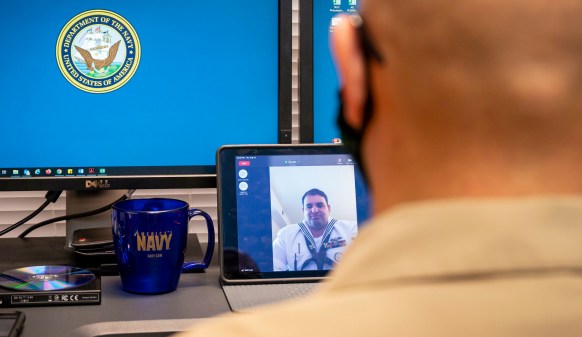Michael Burke, the chief information officer of the National Endowment of the Arts and co-chair of the Small Agency CIO Council, recently sat down for an interview with FedScoop Radio, where he discussed current projects he is working on, trends he sees in federal government technology and the importance of efficiencies in smaller federal agencies.
Below is an edited transcript of the interview.
FedScoop : You are obviously doing a lot of things here and I want to start with the National Endowment of the Arts. Can you tell me a little bit about some of the work you are doing right now and the top priorities in the CIO office?
Burke: The last two years we’ve been focusing on what today we hear called “shared services,” and so all of our focus for maybe as much as seven years now has been on cross servicing with other government agencies and sharing systems that are out there to make it more cost effective for us as a small agency.
The largest thing we have done in that period of time has been our finance system, and now we are focused right now in developing a partnership with the National Endowment for the Humanities to migrate to their web-based grant management system. This is what the major effort for us right now that we are involved in.
The EGMS we call it provides, really all of the back end work processes that we go through here once we have an application from someone for a grant. Since grant making is our primary function, you can imagine that is the lion’s share of the work that we are doing behind the scene. The grant management system then is going to automate everything from the moment we get electronic applications through grants.gov all the way through the grant-making process and then through close out.
It’s a very important application to us and one that will also let us work again in an shared services type of environment. It will be a project that NEH, the Humanities Endowment, is doing the development work on and then that we share in the actual design as we go forward to make sure the things that we need as an agency are accommodated.
FedScoop: What are your priorities going to be going forward?
Burke: One of the things I guess I should mention as a current project, because it ties very much to where we are looking as far as the future is considered. We have a partnership with the Western States Arts Federation to create what we, well I guess to explain our process, we will get application for our grants and with those application come work samples. The work samples can be text files, it can be video, it can be audio clips, photos any number of things and in this partnership all of this is moving toward an electronic environment.
Either applicants are uploading their work samples or giving links to their work samples, which takes the management of all of that physical information that we have had in the pass and made it electronic and much simpler. And for us we see this as a stepping stone towards going to a project this fall that we are calling virtual panels. When we award grants, we will convene a panel of experts in a particular area – let’s say dance. They will review the applications, and they will review the work samples and make recommendations as to who gets a grant from the agency.
Having as much of this electronically presented as we possibly can helps to lower our cost and workload in a lot of different ways. The virtual panel’s process this fall then is going to select a certain area, and we haven’t chosen that area just yet, but say it was dance, as an example, where panelists, instead of coming to Washington and reviewing the work samples and going through the application, they’ll be able to do it from where they happen to be located.
This then cuts down on travel. It cuts down on some premium costs that we would have as far as bringing panels of experts together to be able to go through and make some recommendations about the different kinds of application that we have.
FedScoop: How about trends in the federal IT space? Obviously, as a CIO you see a lot of things going on out there.
Burke Let me talk about this from the small agency standpoint for a minute.
The Small Agency Council: One of the trends that we’re seeing that is extraordinarily helpful to us is a firmer partnership between all the small agencies and the departments.
There was last year for the first time in my time as a CIO here a joint meeting of the departments and the big agencies and then all the small agencies. There was probably about 100 CIOs in the room.
It was brought together by [U.S. CIO] Steven VanRoekel, and I think it was really, really helpful as far as one, establishing relationships between organizations that in the past hadn’t been that closely aligned, and also made it much easier to share information, to share the small agency view and look at that as it relates to how the big departments are doing their business.
We had a lot of discussion around how federal policy that affects the large agencies and departments also affects the small ones. I think that’s been a real important experience for us in the small agency community and sets a good tone for going forward as we start to see a lot of these changes that are coming.
In the small agency arena, I think probably the one thing that stands out most to me is the amount of information sharing that is going on now that wasn’t necessarily occurring maybe two years ago. We have an active list serve, but we are also looking at creating a portal that will improve the kind of information sharing that we’re doing.
There’s been quite a bit of conversation about different types of software, different types of services, all the things that small agencies need that they don’t necessarily have ready access to in terms of information. We talk about shared services but we don’t always all know what kind of shared services opportunities are out there.
For example, NEA uses the Delphi Financial System at the Federal Aviation Administration and a lot of folks didn’t know that that kind of capabilities necessarily was out there. As we’ve shared that information and others have shared what they’re doing, it’s opened a lot of doors as far as how we might move forward to reduce our costs in various agencies. Just the whole opportunity to improve our information sharing capabilities across the agencies has been a real boom for the Small Agencies CIO Council in the last couple of years.
FedScoop: I would have to imagine that would be top focus. Maybe I’m wrong in saying this, but obviously, for you guys, shared services has to be a bigger priority because you don’t have the gigantic eight figure budget that some of these cabinet level agencies have.
Burke: That’s true and we don’t have the staff to go behind that. If we want a financial management system, using that as a continued example, it’s one of those things that to do all of the support work to make it happen is way above the number of employees that we have here in the IT arenas to provide that type of support and the level of help desk and all those other things that go with it.
I think what you’ll see is that the whole arena of shared services, it’ll drive our costs down and give us a more effective way of operating as a small agency. Our staff here, NEA is probably a good example of what a small agency is, we have about 200 people and about 15 or so IT folks supporting the organization.
Even with that size crowd you can’t necessarily support a full up-and-operating finance system. That’s just one example. Having a shared service out there has been really a viable way for us to drive our costs down and also to constrain our IT budget and our whole resource pool over the years.
One of the things that we are looking at now is the whole issue of mobility and we’re looking at tablet computing and what we might do with that. I think that’s sort of a general conversation all around the small agency community and certainly one that we are having here at NEA. To see how we can improve the mobility that we have as employees and of course that boosts not only our ability for our travelers to get more information but also for those folks that are telecommuting to have access to information. This is another area that is very important to us going forward.






